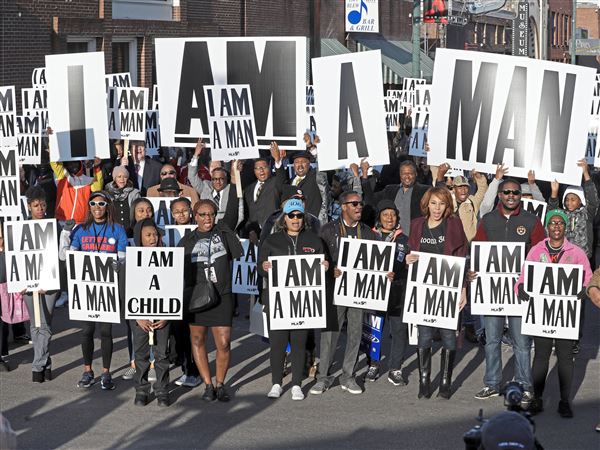In the three years since her best-selling book came out, author Rebecca Skloot has slowly tried to cut back on the number of her speaking engagements.
But when the Pittsburgh Arts & Lectures series asked her to appear tonight to talk about "The Immortal Life of Henrietta Lacks," her book about a woman whose cells live on in laboratories around the world, she couldn't refuse, since she was a graduate student in the University of Pittsburgh's creative nonfiction program when she did much of her early research.
Ms. Skloot and David "Sonny" Lacks, one of Mrs. Lacks' children, will appear together at 7:30 p.m. at Carnegie Music Hall in Oakland. The appearance is sold out, but tickets may be available at the door.
When Ms. Skloot, 40, says she is scaling back on public talks, that's a relative term.
In the year after the book came out, she gave 375 speeches. In 2011, she gave about 260, and last year, she still gave more than 100. All through that time, the book has won awards -- Amazon named it the best book of 2010 -- and has remained on the best-seller list, with the paperback version sitting at No. 4 on The New York Times nonfiction list right now.
Ms. Skloot is trying to hold her appearances to 20 this year, so she can get to work in earnest on her newest book, which will look at the ethics of using animals in medical research, intermixed with her own stories from 10 years as a veterinary technician in animal morgues and research labs.
As she did in "The Immortal Life," Ms. Skloot said she will try to occupy a middle ground, in this case, between animal rights activists and medical researchers.
"Some of the people who are vehemently opposed to animal research can do extreme things, like bombing buildings, and then go home and take medications made possible by animal research," she said in an interview from her Chicago home last week. "On the other hand, a lot of animal researchers don't need to be doing that work in the first place, and that's part of what is giving the research a bad name."
Shifting away from the Henrietta Lacks bandwagon has been difficult, she said.
"The hard thing for me is it means saying no to a lot of people, because I want people to hear the story and ask questions."
Henrietta Lacks was just 31 when she died in 1951 at Johns Hopkins Hospital in Baltimore of aggressive cervical cancer. George Gey, a researcher at Johns Hopkins who had been trying unsuccessfully for years to get cancer cells to grow in the laboratory, discovered that Henrietta's cells would grow and grow, so much so that they could easily contaminate other cell lines in a laboratory.
Because they were so prolific, the HeLa cells, named after the first initials of her names, were used for a huge range of scientific experiments in the ensuing decades. They were critical in testing Jonas Salk's initial polio vaccines. They rode to space to test the effects of weightlessness on human cells. They were used to develop cancer treatments and in vitro fertilization procedures. There are still billions of them in labs around the world.
It was just as important for Ms. Skloot to tell the Lacks family's story. As HeLa cells were being given away or sold around the globe, earning some companies millions of dollars, the children grew up in most cases without health insurance and with no clear idea of what had happened to their mother's cells, which were taken without her consent.
The Lacks family never received a dime from the sale of HeLa cells, and neither did Johns Hopkins or Dr. Gey, who donated samples to other researchers.
Ms. Skloot was just starting to work on the book when she finished her coursework at Pitt's creative nonfiction program around 2000, and it took her another 10 years to gain the Lacks family's trust, write the manuscript and find a publisher willing to bring out the unusual mixture of family saga and science book.
In fact, she ended a contract with one publisher because the editor there said he would only publish the book if the family story was removed. When she tells readers of the book about that, she said, there is always a gasp of horror.
When the book was issued, "I always knew there was the possibility it would come out and disappear," she said, but since then, she has come to the conclusion that the book remains popular because "it is one of the few stories out there where everybody in some way benefited from these cells, and then when they read what happened to the family, they're even more drawn in. At some point, everybody turns the page and says, 'Oh that's me -- I took that drug or that vaccine or I got IVF.'"
Mr. Lacks, a 65-year-old retired truck driver, said that for many years, his family was angry that they didn't get any money from the commercialization of his mother's cells or even have a clear idea of what was being done with them.
His own speaking tours, usually to college campuses, have given him a second career.
"The students ask me if I would give consent for my cells to be used for research, and I tell them research is important and yes, I would give my consent.
"Things have changed because of my mother, and hospitals now have to get written consent."
Ms. Skloot is happy that the Lacks family now can tell its own story, and she is also pleased that she was able to set up a foundation to give grants to family members for educational stipends, health care and other needs. The foundation, seeded with money she and the public donated, has so far given out about 30 grants ranging from $1,000 to $10,000.
The foundation's assets will grow even more, she said, once a movie based on the book is produced on HBO by Oprah Winfrey and Alan Ball, because she made sure the deal included a guaranteed payment to the foundation.
The book also examined the issue of what consent procedures should be in place today and whether people who donate cells should get some of the money from commercializing them. Since it came out, she said, the federal government has proposed an overhaul of the consent law, based in part on a survey that shows people are happy to donate tissue for research, but always want to know when that happens.
The long afterlife of her book, Ms. Skloot said, has surpassed her most optimistic hopes. "It seems to have the same capacity as the cells did, to sort of spread and keep going on."
And, David Lacks added, there is one other message he tries to impress upon college students.
"My mom's legacy is the HeLa cells, and I say yes, it's a part of her that was given and is still giving. But I also let them know she wasn't just her cells, she was a person, a mom and a wife."
Walk-up tickets for the Rebecca Skloot-David Lacks appearance will go on sale at 6:30 p.m. Monday and will be $10 for students with IDs, $15 for general admission and $25-$35 for reserved seats.
First Published: February 4, 2013, 10:00 a.m.

















